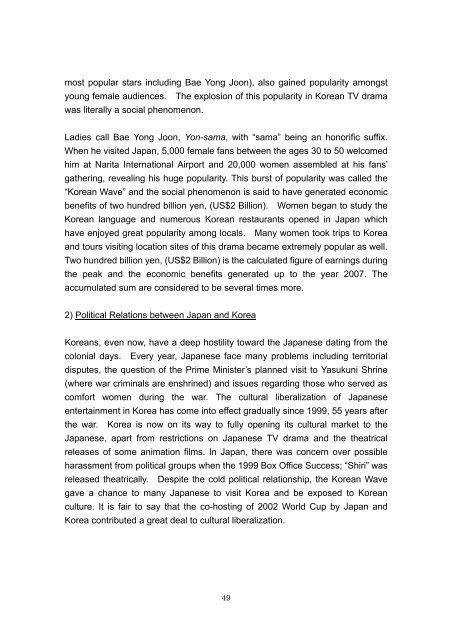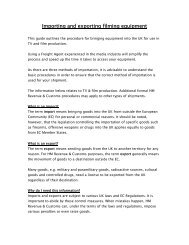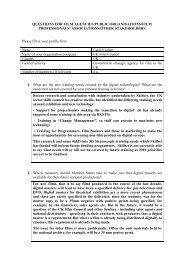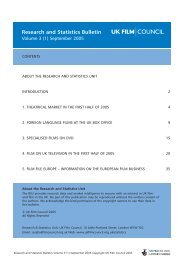The Japanese Market for UK Films - BFI
The Japanese Market for UK Films - BFI
The Japanese Market for UK Films - BFI
You also want an ePaper? Increase the reach of your titles
YUMPU automatically turns print PDFs into web optimized ePapers that Google loves.
most popular stars including Bae Yong Joon), also gained popularity amongst<br />
young female audiences. <strong>The</strong> explosion of this popularity in Korean TV drama<br />
was literally a social phenomenon.<br />
Ladies call Bae Yong Joon, Yon-sama, with “sama” being an honorific suffix.<br />
When he visited Japan, 5,000 female fans between the ages 30 to 50 welcomed<br />
him at Narita International Airport and 20,000 women assembled at his fans’<br />
gathering, revealing his huge popularity. This burst of popularity was called the<br />
“Korean Wave” and the social phenomenon is said to have generated economic<br />
benefits of two hundred billion yen, (US$2 Billion). Women began to study the<br />
Korean language and numerous Korean restaurants opened in Japan which<br />
have enjoyed great popularity among locals. Many women took trips to Korea<br />
and tours visiting location sites of this drama became extremely popular as well.<br />
Two hundred billion yen, (US$2 Billion) is the calculated figure of earnings during<br />
the peak and the economic benefits generated up to the year 2007. <strong>The</strong><br />
accumulated sum are considered to be several times more.<br />
2) Political Relations between Japan and Korea<br />
Koreans, even now, have a deep hostility toward the <strong>Japanese</strong> dating from the<br />
colonial days. Every year, <strong>Japanese</strong> face many problems including territorial<br />
disputes, the question of the Prime Minister’s planned visit to Yasukuni Shrine<br />
(where war criminals are enshrined) and issues regarding those who served as<br />
com<strong>for</strong>t women during the war. <strong>The</strong> cultural liberalization of <strong>Japanese</strong><br />
entertainment in Korea has come into effect gradually since 1999, 55 years after<br />
the war. Korea is now on its way to fully opening its cultural market to the<br />
<strong>Japanese</strong>, apart from restrictions on <strong>Japanese</strong> TV drama and the theatrical<br />
releases of some animation films. In Japan, there was concern over possible<br />
harassment from political groups when the 1999 Box Office Success; “Shiri” was<br />
released theatrically. Despite the cold political relationship, the Korean Wave<br />
gave a chance to many <strong>Japanese</strong> to visit Korea and be exposed to Korean<br />
culture. It is fair to say that the co-hosting of 2002 World Cup by Japan and<br />
Korea contributed a great deal to cultural liberalization.<br />
49
















